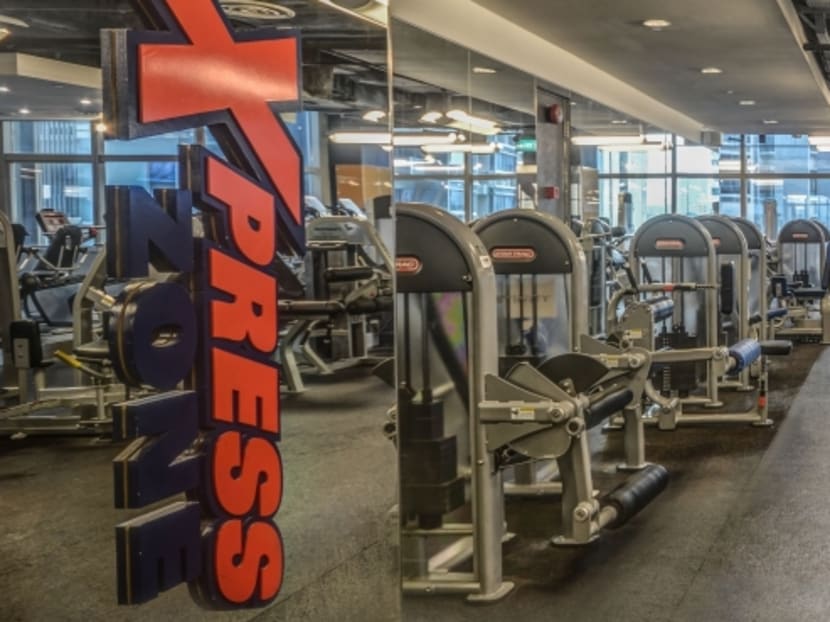California Fitness HK shutdown to affect S’pore?
SINGAPORE — Customers of California Fitness Hong Kong were caught by surprise this week when they turned up at its outlets and found the doors shuttered. JV Fitness, which owns the gym franchise in Hong Kong, China and Singapore, closed all its 12 branches in Hong Kong on Tuesday (July 12), with the outlets in Beijing, Shanghai and Guangzhou following suit.

The California Fitness outlet at Velocity@Novena. Photo: California Fitness
SINGAPORE — Customers of California Fitness Hong Kong were caught by surprise this week when they turned up at its outlets and found the doors shuttered. JV Fitness, which owns the gym franchise in Hong Kong, China and Singapore, closed all its 12 branches in Hong Kong on Tuesday (July 12), with the outlets in Beijing, Shanghai and Guangzhou following suit.
The abrupt closure has left some Singapore gym members jittery about the future of the fitness chain here. California Fitness Singapore — which has three outlets in Bugis, Raffles and Novena — further added to the uncertainty when it could not respond to TODAY’s queries by press time on Thursday.
Members whom TODAY spoke to said they had not received any notice from the Singapore office.
Healthcare worker Martin, who declined to give his full name, said: “I’m concerned as it is the same company that runs all the gyms. I have no idea what the cash flow is like for the company, and they recently closed the Ngee Ann City branch.”
Some members have already been hit by the closures overseas.
Human resources manager Ang Ging Yin, who bought an Asia membership pass in Shanghai for 10,000 RMB – which allows access to gyms in China, Hong Kong and Singapore — was refused entry at the Bugis outlet on Wednesday night.
“The assistant member service manager said she has to deny me entry because I am a China member,” said the 34-year-old. “I was taken aback as I have been using it since I returned to Singapore from Shanghai last year. She said management had given notification that Singapore was a standalone (company) now. I don’t know how I can get a refund.
“I have been a California customer for six years but after the incident and the recent news, this just leaves a bad taste in consumers’ mouths.”
Andrew Phillips, the Managing Director of Fitness First Singapore, said that addressing members’ concerns was key. He said: “California Fitness should in light of the sudden closures in Hong Kong, respond quickly to update their stakeholders on whether Singapore operations will be affected or if it will be business as usual ... its members need to know that their memberships will not be mishandled.”
Part of a wave of big-brand gyms that sprouted here in the past two decades, California Fitness — which opened in January 1998 — shut its Orchard branch in February, citing “variable business strategies and decisions” for the closure. Other gym operators such as women’s only gym Vivafit and True Group had also closed outlets in recent years.
With increasing rental costs and competitors muscling in on the scene amid a challenging economic climate, industry experts whom TODAY spoke to said it is crucial to stay innovative and relevant to the customers’ needs. “There’s no shortage of exercise styles, trends and fads in Singapore today ... the fitness business has become incredibly competitive,” said Phillips.
The fitness chain will be launching a new club concept at their Capital Tower outlet next month, said Phillips. “Trends come and go quickly and customers can be fickle, so fitness brands need to work at staying relevant to our members’ fitness needs and lifestyles,’ he said.
“We also need to be agile enough to innovate and be in a position to provide the most up to date expertise to deliver the best results for our members.”
Irving Henson, who is the managing director of strength and conditioning gym The Pit, believes that big-brand franchises like California Fitness need to rethink their business model of selling multi-year packages to keep up with the changing times, particularly with 24-hour gyms like Anytime Fitness and Gymm Boxx opening in the heartlands.
“They sell memberships for three years, which means no revenue (after the initial sale) and with rentals going up, that’s not a very sustainable plan,” he said. “People don’t want to be tied down. Some of them like Gymm Boxx charge per entry and there are so many choices now.
“The market is very saturated, but it all works well together ... we are a small facility and we work on building our brand in strength and conditioning.”
Added former national sprinter Muhammad Amirudin Jamal, manager of Anytime Fitness at the Kallang Wave Mall: “We try to give our members value for money, and show them that it’s a worthy investment in themselves and make them feel like they are part of the community.
“We are working on our customer service. It’s no longer about a customer coming in to do their own workout, but people picking where they want to go based on their relationships with the people there.”





